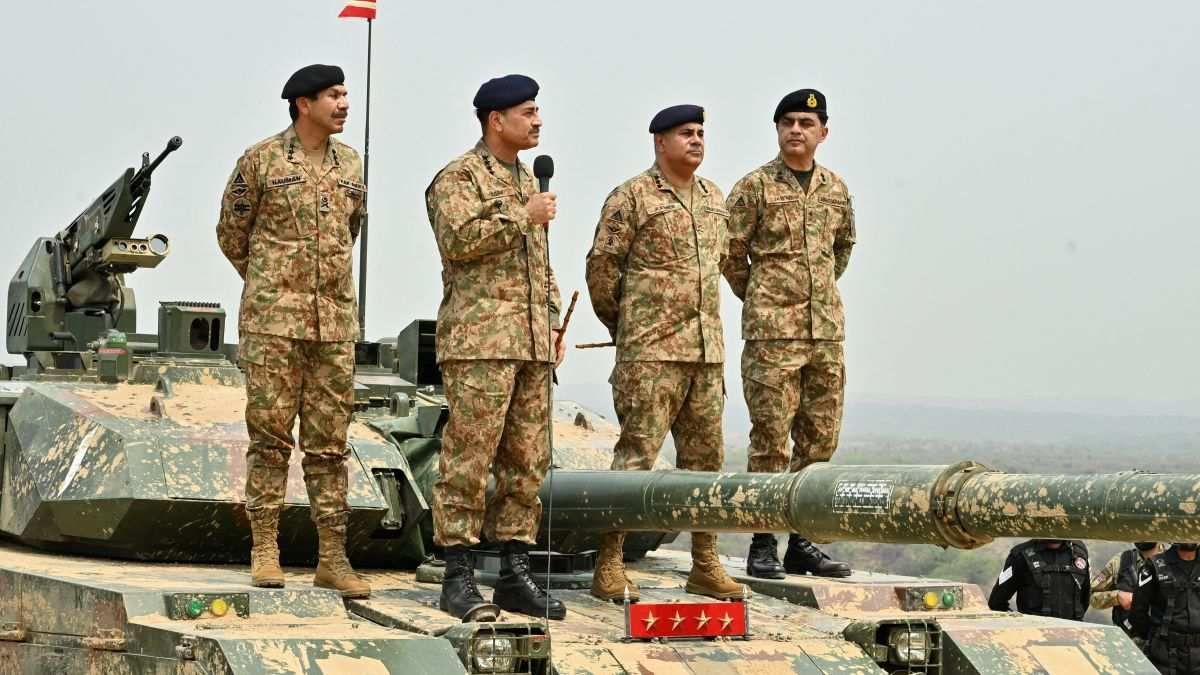Earlier this month, Pakistan’s National Assembly rammed through a controversial constitutional amendment that grants Field Marshal Asim Munir, the country’s de facto leader, lifelong immunity from all crimes.
“What was effectively already de facto military rule has become constitutional,” said Eurasia Group’s South Asia Practice Head Pramit Pal Chaudhuri. “It’s effectively a constitutional coup.”
So how did Pakistan get here? As a country flanked by two longstanding rivals – India and Afghanistan – Pakistan has relied heavily on its military throughout its 80-year history. As a result, military leaders have typically wielded immense political power, controlling the country both directly and indirectly for most, if not all, of Pakistan’s near-80-year existence.
The military faced a challenge, though, in 2018, when the charismatic and telegenic former cricket star Imran Khan won a free and fair election on a populist platform. Although he initially enjoyed the support of “The Establishment,” as the military is known, Khan quickly got into conflict with the generals. One of his most brazen acts against the brass was, in fact, to reassign the head of the country’s spy unit at the time, one Asim Munir.
Khan’s power didn’t last. He was ousted in 2022, and jailed on corruption charges. His party would remain popular, winning the most seats in the 2024 election, but the government – under military influence – refused to seat many of its female and minority candidates, leaving Khan’s party in the minority.
As for Munir, he would get his own back: with Khan out of power and behind bars, the one-time spy chief rose the ranks of the military to become army chief. In May of this year, he seized on the latest Kashmir crisis – which put India and Pakistan on the brink of all-out war for several days – to become Pakistan’s second-ever five-star general, the highest possible military ranking. His latest effort goes a step further, amending the 1973 constitution in a way that opens the path for an outright power grab.
“One of the things in the 1973 constitution is: if you declare martial law, you’re tried for treason,” Dr. Ayesha Siddiqa, a Pakistani military expert at King’s College London, told GZERO. “So if tomorrow [Munir] declares martial law, he cannot be tried for treason.”
Munir’s in charge – what issues does he face? First and foremost, the economy. Pakistan’s economy has been stagnant for 50 years. In the 1970s it was the richest country in South Asia – now it’s one of the poorest. In addition, it has $6.5 billion in outstanding IMF loans, the fifth-most in the world. Many Pakistanis are seeking opportunities abroad.
“If you look at the size of the middle class in Pakistan, it’s effectively shrinking, which is the exact opposite of what you should want in a developing country. Because the taxation system is rising and incomes are not rising,” said Chaudhuri. “If you’re a smart young businessman, you fly to Dubai.”
The field marshal has been cozying up to the Trump administration – an unusual move given Pakistan’s close ties to China – in a bid to sell some of its sizable deposits of rare-earth minerals to the United States.
The other major issue for Munir is the Taliban, the one-time allies of Pakistan who now hold power again next door in Afghanistan. Last month, the two countries had one of their worst border disputes in years, and now Pakistan is bombing the Afghan capital of Kabul in response to a spate of terrorist attacks in Islamabad.
There’s one thing Munir won’t have to worry about. Pakistan’s opposition is toothless right now, Siddiqa said. The opposition has a top-down structure, meaning that with Khan in jail, the party is largely adrift, with weak local representation.
What’s more: the government has been cracking down on dissent.
“Imran Khan is in jail, and there’s nobody else around his party which can actually start a public movement, get people out on the streets,” said Siddiqa. “And also, as a result of the May 9 [conflict with India], the media has been managed. People have been tortured, people have been picked up, disappeared, etc. So with that kind of authoritarianism, people are too scared to come out.”relatively modest purchase.
The other major issue for Munir is the Taliban, the one-time allies of Pakistan who now hold power again next door in Afghanistan: last month, the two countries had one of their worst border disputes in years, and now Pakistan is bombing the Afghan capital of Kabul in response to a spate of terrorist attacks in Islamabad.
There’s one thing Munir won’t have to worry about. Pakistan’s opposition is toothless right now, Siddiqa says. The opposition has a top-down structure, meaning that with Khan in jail, the party is largely adrift, with weak local representation.
What’s more: the government has been cracking down on dissent.
“Imran Khan is in jail, and there’s nobody else around his party which can actually start a public movement, get people out on the streets,” said Siddiqa. “And also, as a result of May 9, the media has been managed. People have been tortured, people have been picked up, disappeared, etc. So with that kind of authoritarianism, people are too scared to come out.”



















